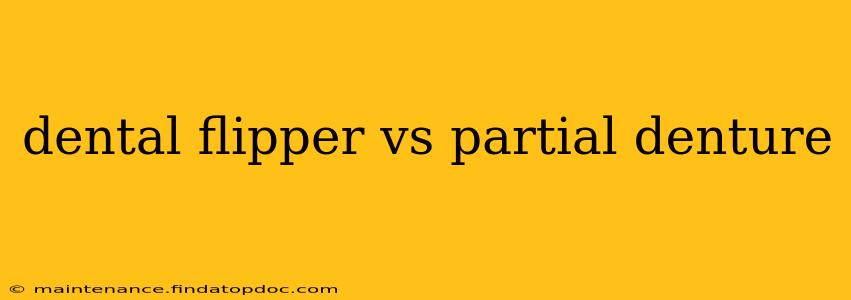Losing teeth can be a significant life event, impacting both your confidence and your ability to eat comfortably. When facing tooth loss, two common restorative options emerge: the dental flipper and the partial denture. While both aim to replace missing teeth, they differ significantly in design, cost, longevity, and overall suitability. This comprehensive guide will explore the key differences between dental flippers and partial dentures, helping you make an informed decision about which option best suits your individual needs.
What is a Dental Flipper?
A dental flipper, also known as an immediate denture or a temporary partial denture, is a removable appliance designed to replace one or a few missing teeth. It's typically made from acrylic resin and is crafted to match the color of your natural teeth. Its simple design makes it a relatively inexpensive and quick solution for temporary tooth replacement. Think of it as a short-term fix, often used while waiting for a more permanent solution like a dental implant or a fixed partial denture.
What is a Partial Denture?
A partial denture is a more substantial and durable option compared to a flipper. It's designed to replace multiple missing teeth and often incorporates a metal framework for added strength and stability. This framework helps to anchor the denture securely in your mouth, offering a more comfortable and reliable fit than a flipper. Partial dentures are generally made from a combination of acrylic resin and metal, with teeth crafted to blend seamlessly with your existing natural teeth.
Dental Flipper vs. Partial Denture: Key Differences
| Feature | Dental Flipper | Partial Denture |
|---|---|---|
| Cost | Less expensive | More expensive |
| Durability | Less durable; prone to breakage and wear | More durable; longer lifespan |
| Stability | Less stable; may shift easily | More stable; better fit and retention |
| Appearance | Can appear less natural | More natural-looking appearance |
| Material | Primarily acrylic resin | Acrylic resin and metal framework |
| Use Case | Temporary solution; quick tooth replacement | Long-term solution; replaces multiple teeth |
| Maintenance | Requires regular cleaning; prone to staining | Requires regular cleaning; generally more resilient |
| Number of Teeth Replaced | Typically replaces 1-3 missing teeth | Can replace multiple missing teeth |
How Long Does a Dental Flipper Last?
A dental flipper is designed to be a temporary solution. Its lifespan typically ranges from a few months to a couple of years, depending on your oral hygiene practices and the extent of wear and tear. Regular cleaning and careful use can help extend its lifespan.
How Long Does a Partial Denture Last?
Partial dentures are considerably more durable than flippers. With proper care and maintenance, a partial denture can last for several years, even up to a decade or more. Regular checkups with your dentist are crucial for ensuring its proper fit and longevity.
What are the Pros and Cons of a Dental Flipper?
Pros of a Dental Flipper:
- Affordable: Flippers are significantly cheaper than partial dentures.
- Quick turnaround: They can often be fabricated and fitted within a few days.
- Suitable for temporary use: Ideal for bridging the gap while waiting for more permanent treatment.
Cons of a Dental Flipper:
- Less durable: Prone to breakage and wear.
- Poor fit: Can shift easily and cause discomfort.
- Unnatural appearance: May not look as natural as a partial denture.
What are the Pros and Cons of a Partial Denture?
Pros of a Partial Denture:
- Durable: A longer lifespan than a flipper.
- Stable fit: Provides better retention and comfort.
- Natural appearance: Blends seamlessly with your natural teeth.
Cons of a Partial Denture:
- Expensive: Significantly more costly than a flipper.
- Requires more adjustment: Might require multiple adjustments for a perfect fit.
- Can be more challenging to clean: Requires diligent cleaning to prevent plaque buildup.
Which is Better for Me: Flipper or Partial Denture?
The best option for you will depend on your individual circumstances and needs. A dental flipper is best suited for temporary tooth replacement, while a partial denture is a more permanent and durable solution for replacing multiple missing teeth. Discuss your options with your dentist to determine which solution is most appropriate for your specific situation. Factors they will consider include the number of missing teeth, the health of your remaining teeth and gums, and your overall budget.
Remember, this information is for general knowledge and does not constitute medical advice. Always consult with a qualified dentist to discuss your specific needs and treatment options.
